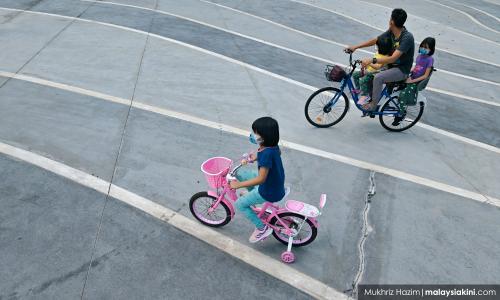LETTER | Why is there no parent in the child narrative?
LETTER | Child rights have been trending in the Malaysian mass media for weeks. But there is no parent in the narrative.
That is puzzling for a start. Even worrying, considering that most children in orphanages reportedly do have parents.
Parents not only produce children but also feed and clothe them, care for their health and nurture them into adulthood as if it was their most valued vocation and children their most treasured possessions.
There is thus a mutually beneficial relationship that brings joy to the parent and provides comfort and safety to the child.
In return, parents get to set rules for and discipline children under their care. No one has a greater right over children than their parents. This has been the case throughout history, is still the case and will surely continue to be so into the unseen future.
So, should we get the children in orphanages back to their parents? The trending answer seems to be no.
In fact, the child narrative has become unhinged from reality.
Centrality of individuals
It assumes without debate that children are little individuals like adults with individual rights and that the state must ensure these rights are protected.
These assumptions can be traced back to post-WWII liberal leaders of Western Europe who educated post-colonial Asian leaders on the centrality of individuals including children and that they all have individual "rights".
When the said individuals live together as "civilised" societies, they should have certain common "values".
Following the logic of Western European leaders, children live with their parents by choice and have the right to the option of choosing to live elsewhere.
Thus we see post-colonial Malaysian child advocates among NGOs, doctors, lawyers, academics, etc., whose ancestors lived under Western European colonialism. Even the minister of youth and sports jumped on the child media bandwagon for reasons best known to her.
Many among the highly school-educated in Malaysia look to Western Europe as the source of human values and civilisation in general.
Abandoned children
There is no apparent argument or movement from these leading lights with regard to issues involved in getting abandoned children home with their parents.
It seems that raising children can be more capably managed by able and willing self-appointed experts with special knowledge.
Proponents of child rights want laws changed, stakeholders educated, resources mobilised and even a whole new sub-bureaucracy inserted into an already bloated public services bureaucracy.
Backing them with press statements has been United Nations International Children's Emergency Fund (UNICEF). UNICEF declares it was established in 1946 to protect the lives and future of at-risk children post-war.
Why UNICEF continues to exist through 70-plus years of world peace with a multi-billion dollar budget and offices worldwide including in Malaysia is a mystery.
Malaysians have read news of the Scandinavian state that sanctioned one of our mothers who took the clothes hanger to her child. Children in Europe know they can call up the friendly lady at welfare if a parent becomes too difficult.
Reasonably good job
But don't rights go together with responsibilities? And who is to teach children their responsibilities as children and when they grow to adulthood?
Children do not start out knowing their rights (or responsibilities). Traditionally, parents have taught them these things and seem to have done a reasonably good job.
What happens when there is an issue and a stranger (say, a Welfare Department officer) intervenes in a family on behalf of a child?
Does the child understand the role of the intervener? Is he even capable of understanding? Does he have the right to know the role of the intervener?
If the child has the right to know what this stranger is doing in his home but does not, is the intervention a violation of the child's rights?
Who or what is "child protection" for?
If it is for orphans or children abandoned by their parents, then we already have the public infrastructure in place for that.
One can understand advocates for stray animals, for refugees, for the destitute in our highly unequal society. Even refugees and the destitute insist on living as family units whenever possible because that is where individuals find their critical needs for comfort and safety.
Why should children need advocates sans parents?
There was a time when governments let people live their lives undisturbed unless someone committed murder or theft.
Idle busybodies
There was no question then, and none now in fact, about anybody being better at parenting than parents.
So, one has to wonder whether advocates for the child are merely idle busybodies indoctrinated by a sick Western European society whose forefathers engaged in two world wars that massacred tens of millions.
The sickness referred to is revealed when, say, a carpenter who gets his 12-year-old child to help him and learn a skill is treated like a criminal engaged in child labour, or when a girl in full puberty is denied her natural right to marriage.
Advocates hold up the Convention on the Rights of the Child like it is a holy grail. Not all countries have ratified the convention.The US has not ... reportedly arguing that it would cause unlimited interference in family life.
Are Malaysia's child advocates against family life?
The views expressed here are those of the author/contributor and do not necessarily represent the views of Malaysiakini.
RM12.50 / month
- Unlimited access to award-winning journalism
- Comment and share your opinions on all our articles
- Gift interesting stories to your friends
- Tax deductable
